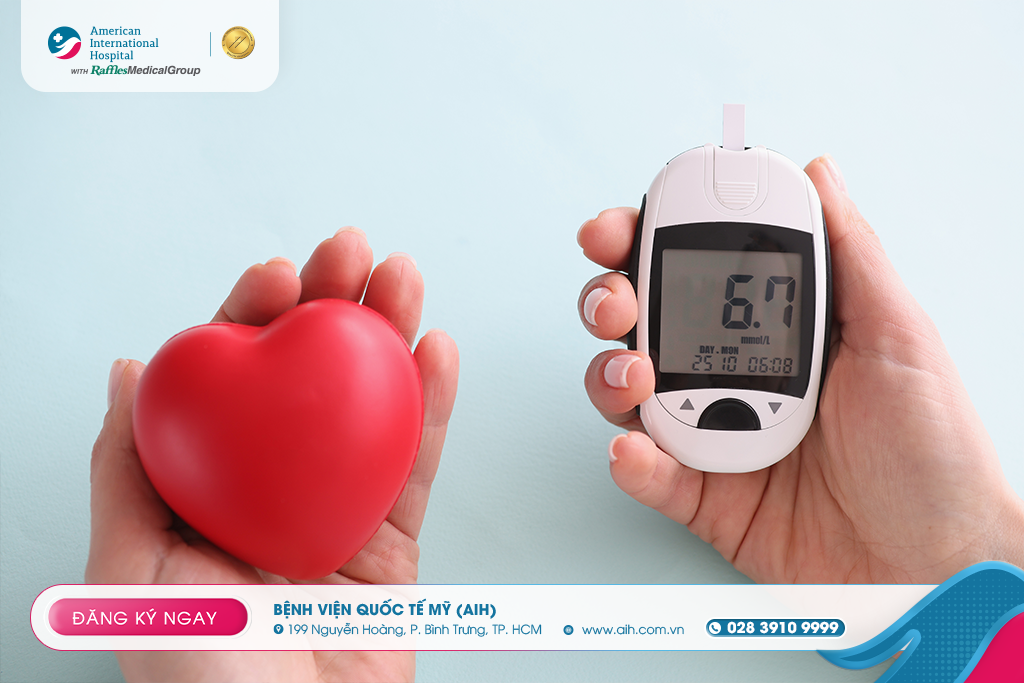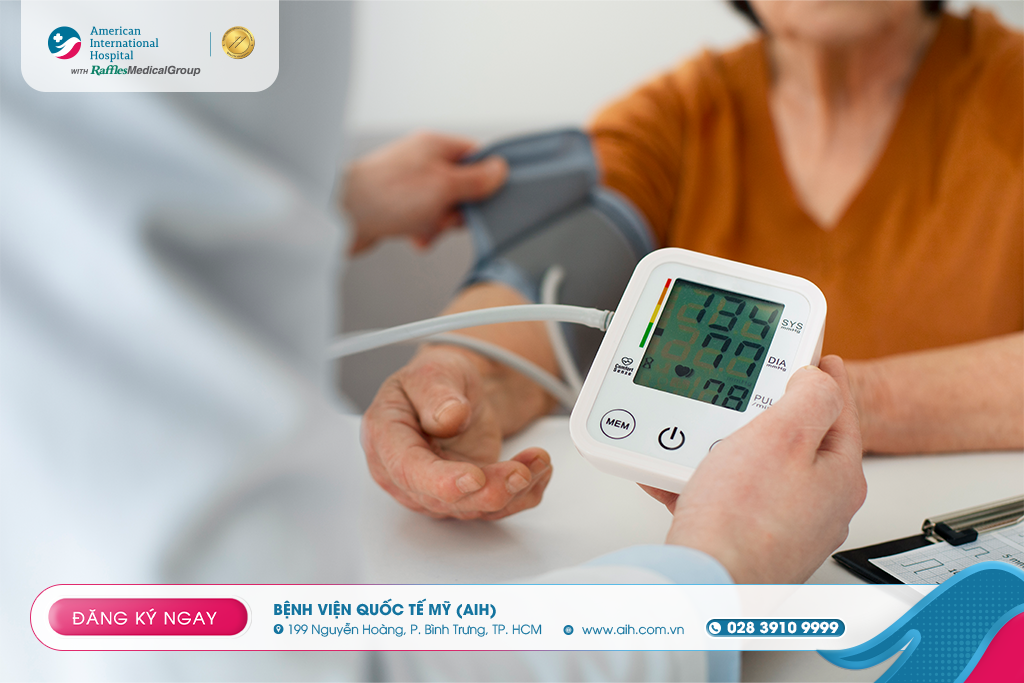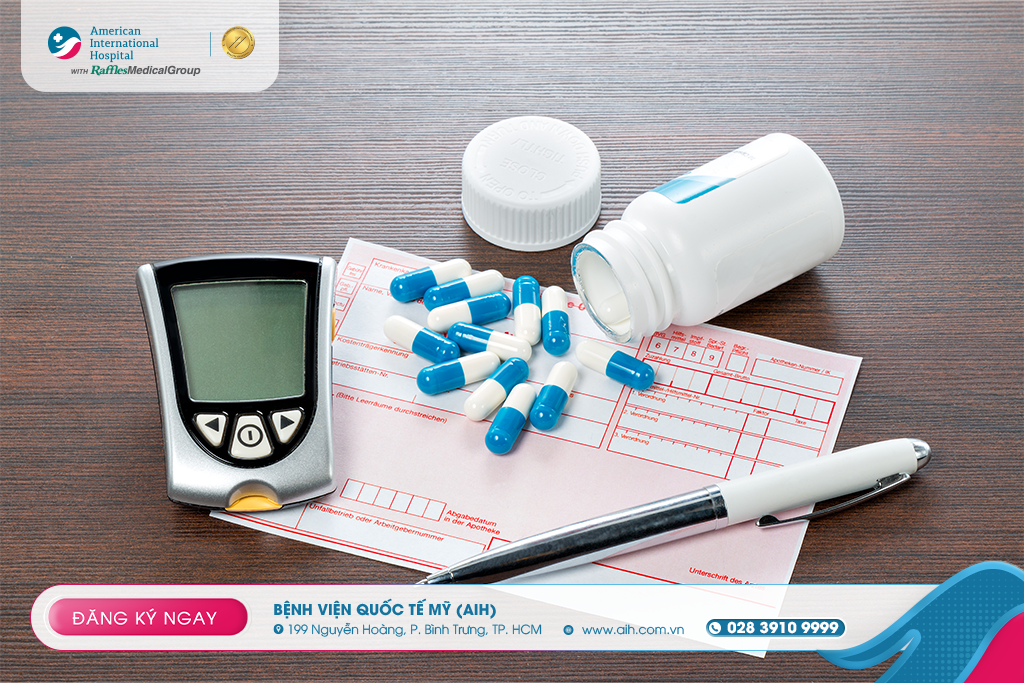- Obstetrics And Gynecology
- Pediatrics
- General Surgery
- Urology & Andrology
- Gastroenterology - Hepatology
- Oncology Unit
- Endocrinology
- Neonatal Intensive Care Unit
- Dental Clinic
- Ophthalmology
- Cardiology
- Physiotherapy - Rehabilitation
- Internal Medicine
- Cosmetic Care
- Otorhinolaryngology (ENT)
- Imaging
- Laboratory
- Outpatient & Health Check-up
- Emergency & ICU
- Anesthesiology
- Nutrition
- Orthopedics
- Neurosurgery – Spine Unit
- Nguyen Hong TrungRead moreBook
MD. MSc. Nguyen Hong Trung graduated as a General Practitioner and has master’s degree in Surgery from Hue University of Medicine and Pharmacy. Dr. Trung has more than 30 years of experience in management, examination and treatment at major hospitals in Ho Chi Minh City. Previously held many important positions such as Professional Director at Hanh Phuc International Hospital, Hoan My Binh Duong Hospital. At the present time, Dr. Nguyen Hong Trung is serving as Medical Director at American International Hospital (AIH).
- Ong Kian SoonRead moreBook
Dr. Ong Kian Soon graduated from the National University of Singapore in 2004 and is a registered Family Physician by the Ministry of Health of Singapore. His clinical experience includes working in various private and public hospitals in Singapore, in both outpatient clinics and in the in-patient wards. He is active in promoting Family Medicine in Vietnam and has worked with Pham Ngoc Thach University of Medicine to promote family medicine in HCMC. He was also an invited speaker at several family medicine conferences to discuss the model of family medicine as practiced in Singapore.
- Saijo YasuoRead moreBook
Professor - Dr. Saijo Yasuo is a leading expert in medical oncology with over 40 years of experience. He has held many important positions at prestigious oncology hospitals in Japan. Starting in October 2024, he will serve as a senior doctor at the Oncology Center of American International Hospital (AIH), where he will provide advanced and effective treatments at international standards to patients in Vietnam. Before joining American International Hospital (AIH), Professor Saijo Yasuo was the Head of Department and Professor at Hirosaki University Hospital and Tohoku University Hospital. He has left a significant mark with groundbreaking research and dedication in the field of oncology, making great contributions to patient care and medical education.
- Mihajlovic JadrankaRead moreBook
Dr Jadranka Mihajlovic graduated in 2001 from the Medical University of Serbia. She achieved extensive training and gained vast experience in the medical fields of Internal Medicine, Infectious Disease, and Medical and Trauma Emergencies. She has worked in both large and small medical facilities and managed emergency situations including road accidents and medical air evacuations. In recent years, Dr Jadranka has developed an interest in adopting a more personalized approach to treating patients. This includes combining lifestyle changes, providing advice on improving mental health, incorporating supplements if needed, and prescribing medication tailored to each person’s unique needs.
- Robert Francois Marie RicheRead moreBook
Dr.Riche has over 22 years expertise in Obstetrics and Gynecology Surgery with both practical and teaching appointments specialized in Breast Cancer and Gynecological Laparoscopic Surgery. Dr.Riche has also headed department in these specialty areas through planning, teaching, ensuring the quality as well as succesfully meeting international and professional quality improvement standards.
- Nguyen Manh Hung
- Orly Attia DafniRead moreBook
Dr. Orly Dafni Attia brings over 25 years of dedicated experience as a pediatrician, specializing in various aspects of child healthcare. Her expertise includes diagnosing and treating common infections, conducting neonatal check-ups, monitoring developmental milestones from birth, administering vaccinations, and addressing feeding and growth issues in children. She also offers evaluation and treatment for children on the autistic spectrum, as well as those with ADD, ADHD, and other learning disabilities. Dr. Orly collaborates closely with kindergartens and international schools to ensure the early detection and intervention of developmental delays in children. Since relocating to Vietnam in 2009, Dr. Orly has served in various medical clinics across Hanoi and Ho Chi Minh City, including Family Medical Practice, Raffles Medical and Hanh Phuc Estella Clinic.
- Nguyen Viet ThinhRead moreBook
Getting his biggest motivation from the desire to help many people’s lives, Doctor Nguyen Viet Thinh made his best endeavors to fulfil his dream of becoming a doctor. Having the opportunities to work in many large hospitals with leading experts and foreign specialists, he always serves with a non-stop learning spirit to strengthen his knowledge on orthopedics and gain more professional experience to provide his patients with the most excellent care he can.
- Esser Rene DanielRead moreBook
Dr René D. Esser grew up in France since childhood. He graduated from the Paris University School of Medicine where he also trained in orthopaedic and trauma surgery. Dr René D. Esser has made humanitarian tours around the world (South Pacific, Africa) since his graduation. He visited Vietnam on a regular basis (4 times a year) during the past 12 years to attend difficult cases, to teach Vietnamese surgeons and came to know quite well the common pathology in Vietnam.
- Mai Thanh CucRead moreBook
Dr. Mai Thanh Cuc has over 30 years of experience in the field of Oncology and is currently working at the Oncology Department of the International American Hospital. Having worked for many years in the oncology, Dr. Cuc shares that the principle of oncologists is to listen, share, and understand the concerns of patients. With their knowledge and experience, they explain in detail so that patients can clearly understand their condition. From there, patients can accept their situation more gently, confidently cooperate with doctors in the persistent journey to overcome the terminal illness.
- Ho Nguyen TienRead moreBook
Dr. Ho Nguyen Tien was resident doctor at Antoine Beclere Hospital – APHP - Paris - France in 2008, graduated resident doctor in 2006. He took up Specialization and Master of Medicine in O&G in 2006 and General Doctor in 2002 at the Hue University of Medicine and Pharmacy. He has over 20 years of specialized experience in Obstetrics and Gynecology as prenatal diagnosis, gynecologic laparoscopy, hysteroscopy, urinary incontinence and genital prolapses surgical treatment moreover with extensive experience in laparoscopic surgery and training in France and Singapore as well as in Vietnam, Dr Ho Nguyen Tien is now the one who performs complex Uro- gynecological laparoscopic surgeries at the Hospital.
- Vu Van PhiRead moreBook
Specialization degree I Dr. Vu Van Phi, with 20 years of extensive experience working in major international obstetrics and gynecology hospitals, he has held senior advisory positions in the field of obstetrics and gynecology and has gained high trust from colleagues and customers. Specialization degree I Dr. Vu Van Phi is highly beloved within the expectant mother community for his humorous personality, psychological understanding, friendliness, and ability to alleviate worries during pregnancy for parent-to-be. Specialization degree I Dr. Vũ Văn Phi is well-known for his "magical hands" and high level of competence/ good-looking incision, has extensive experience in providing care of difficult births, pathological management during pregnancy and common obstetric complications. Currently, Specialization degree I Dr. Vu Van Phi is serving as the Deputy Head of Obstetrics and Gynecology, American International Hospital (AIH).
- Vu Nhat LinhRead moreBook
Prior to his career at American International Hospital (AIH), Doctor Vu Nhat Linh has over 15 years journey in the field of medicine as an obstetrician and gynecologist at many large hospitals including Mekong Obstetrics and Gynecology Hospital, FV Hospital, Vinmec Hospital, Hung Vuong Hospital, etc. and as a lecturer at Pham Ngoc Thach University of Medicine. Doctor Linh is an active member of our enthusiastic team of obstetricians and gynecologists. In addition to his frequent duties of offering pregnancy care and delivery services, he has also been involved in sharing his knowledge at AIH’s prenatal classes.
- Vo Bich Dai HaoRead moreBook
Second-degree specialist, Dr. Vo Bich Dai Hao is a surgeon with over 25 years of experience, successfully performed thousand cases with the patient safety as the top priority, follows the standards of practice of Ministry of Health. Dr. Hao holds a degree of second level specialist from the University of Medicine and Pharmacy in Ho Chi Minh City. He has also received specialized training in advanced cancer practice, diagnostic imaging, and hepatic tumor ablation at various universities and major hospitals in Ho Chi Minh City. During his medical career, second-degree specialist, Dr. Vo Bich Dai Hao has received numerous prestigious awards such as "Golden Hand of Medicine”, “Successfully managed a red alert case of patient with cardiac perforation wound by surgical therapy”, “Successfully managed an emergency case of femoral artery rupture”, “implementation of transhiatal esophagectomy, transcervical and transabdominal gastric tube esophagoplasty”. With the principle of always prioritizing patient safety on top, constantly listening to and closely monitoring patients before, during, and after surgery to ensure that patients achieve the best treatment outcomes. Currently, second-degree specialist, Dr. Vo Bich Dai Hao is the Head of the General Surgery Department at the American International Hospital (AIH).
- Nguyen Ngoc TienRead moreBook
Dr. Nguyen Ngoc Tien is a senior medical executive with over 35 years of experience in medical care and management. This role is supported by his solid educational background in urology in Vietnam, France and Belgium. He has long been using his best endeavors to contribute to the improvement of healthcare services in Vietnam. With his considerable international experience, Doctor Tien has been playing a key role in the establishment of American International Hospital (AIH), with particular emphasis on building up strategic partnerships between AIH and leading medical systems in the U.S.. Dr. Nguyen Ngoc Tien is currently Management Board Member cum Medical Counselor of the hospital.
- Truong Da UyenRead moreBook
Dr. Truong Da Uyen is an endocrinological expert with over 25 years of experience in diagnosis, treatment and research. She is well recognized as an angelic doctor with expertise, solid experience, and, especially, a great tenderness and compassion for patients. Dr. Uyen has authored some published articles in endocrinology journals. She is also an active member of some domestic and international associations of endocrinology and diabetes treatment.
- Nguyen Thinh VuongRead moreBook
Having graduated at a good grade from Ho Chi Minh City University of Medicine and Pharmacy in 1995, then got Bachelor of Art in English 1998, Dr. Vuong has experienced 30 years of working for many famous hospitals in Vietnam. She has also fulfilled two post-graduated specialty courses on emergency and endocrinology. She is especially highly experienced in diabetes care. She has participated in many international conferences in the US and is also a member of ACEP (American College of Emergency Physicians) and American Endocrine Society.
- Strati Julian AlbertoRead moreBook
Dr. Julian Strati, an Argentine medical doctor, has over 15 years of extensive experience in intensive care (ICU), including 5 years of ICU management. Dr. Julian has lived and worked in Ho Chi Minh City, Vietnam, for more than 6 years. He is distinguished in the field of respiratory care, with expertise in mechanical ventilation, bronchoscopy, and post-mechanical ventilation recovery. He also specializes in procedures such as percutaneous tracheostomy and managing vocal cord dysfunction after intubation. Throughout his career, he has held significant roles at hospitals in Buenos Aires, such as Hospital Interzonal General de Agudos Guemes de Haedo, Clinica Olivos, Swiss Medical Group, and the Family Medical Practice clinic system in Ho Chi Minh City. With a solid educational background from the University of Buenos Aires and advanced specializations in intensive care and pulmonology, Dr. Julian continually strives for continuous learning and provides the best patient care in the field of intensive care medicine.
- Bui Thi Thuy TamRead moreBook
Dr. Bui Thi Thuy Tam works in the Department of Pediatrics - Neonatology at American International Hospital. Dr. Tam has over 15 years of practical experience, having worked at Children's Hospital in the specialized clinical disciplines of General Pediatrics and Neonatology. Dr. Tam is well-liked for her kindness, tenderness, and commitment to children, in addition to her strong skills and great sense of responsibility.
- Tran Hai DangRead moreBook
With over 25 years of experience in the field of diagnostic imaging, Dr. Tran Hai Dang has worked at many well-known hospitals and clinics such as Vinmec, Viet Phap, Huu Nghi, and SOS International Clinic. Notably, he has been involved since the very first days in the establishment of the American International Hospital. Graduating from Hanoi Medical University, Dr. Hai Dang continued to enhance his expertise in France through specialized training programs in diagnostic X-ray and medical imaging at Reims University and Clermont-Ferrand University. He has also obtained several important certificates such as interventional radiology and Doppler ultrasound in Switzerland, along with prestigious certificates from the Radiological Society of North America and Societe Francaise de Radiologie. Currently, he serves as the Head of the Department of Diagnostic Imaging at the American International Hospital (AIH).
- Nguyen Thi Ngoc LanRead moreBook
Second-degree specialist, Dr. Nguyen Thi Ngoc Lan has over 35 years of experience in diagnosing and treating intensive OB&G conditions, particularly in providing care for high-risk pregnancies at major hospitals in HCMC. Guided by the motto: "give trust – embrace peace," Dr. Lan is always dedicated to her profession, prioritizing the health and well-being of her patients above all else. With her cheerful, gentle, and psychological understanding approach, she brings a sense of comfort, closeness, and peace of mind to the customers and their families. With continuous efforts to improve herself, second-degree specialist, Dr. Nguyen Thi Ngoc Lan has obtained numerous basic and intensive training certifications not only in Vietnam but also from international training and cooperation programs with hospitals and medical schools in France. The greatest motivation that helps Dr. Ngoc Lan maintain her passion for the profession and dedicate herself to it until today is the trust and appreciation she receives from families in her role as a “skillful obstetrician with cosmetic suturing technique”.
- Nguyen Thi Nhu Ai
- Duong Thuy Lien
- Tran Thi khue VyRead moreBook
Over 35 years of experience and advanced training in Vietnam and overseas, Dr. Tran Thi Khue Vy has gained a high level of expertise and experience in cardiology. Highly qualified and fluent in both French and English, Dr. Tran Thi Khue Vy spent many years of overseas study and earned associate degree in cardiovascular, ultrasonography, and many other certificates in cardiology in France. She also participated in other short-term courses and medical conferences outside Vietnam. Doctor Vy is now at AIH Cardiology Department.
- Tran Thu PhuongRead moreBook
Dr. Tran Thu Phuong has over 30 years of experiences in Imaging and until now, she still shows great passion for her work. Understanding the important role of imaging, she always tries to improve her professional knowledge and support her colleagues so that they can best diagnose illnesses and treat patients.
- Nguyen Thi Dieu VyRead moreBook
With more than 10 years of experience in intensive care, specialist level II Dr. Nguyen Thi Dieu Vy has earned achievements such as Excellent Junior Doctor at Trung Vuong hospital and proactive doctor who participated in anti-epidemic activity for the community awarded by the HCMC People's Committee. Dr. Dieu Vy has used to work in the major hospitals such as District 4 Hospital, Trung Vuong Hospital. Currently, specialist level II Dr. Nguyen Thi Dieu Vy is serving as Internist at the American International Hospital (AIH).
- Nguyen Dinh My
- Quach VanRead moreBook
Intensive research and training accomplished in Obsterics and Gynecology at the Pham Ngoc Thach University of Medicine, HCMC. M.D Quach Van has obtained a doctor degree in 2011 and completed several Gynecology training courses at the Tu Du Hospital. Once being appointed as the Head of Obsterics and Gynecology, District 6 Hospital since 2017.
- Nguyen Tam Xuan KietRead moreBook
1st-degree specialist, Dr. Nguyen Tam Xuan Kiet graduated as a General Practitioner from Pham Ngoc Thach University of Medicine and completed the 1st-level specialist program in Emergency and Toxicology in 2023. With over 6 years of experience in the field of emergency and resuscitation, he has worked at several major hospitals and healthcare organizations such as the 115 Emergency Center in HCMC, International SOS, Gia An 115 Hospital, etc. Notably, since May 2024, he has been associated with American International Hospital (AIH) in the role of part-time Emergency & ICU Physician. Currently, he officially holds the position of full-time Emergency & ICU Physician at AIH, continuing to provide dedicated care and solid expertise in emergency treatment.
- Tran Hong PhucRead moreBook
Dr. Tran Hong Phuc is an anesthesiologist with nearly 30 years of experience in both Vietnam and overseas. He received specialty training in anesthesiology at University of Paris V – Rene Descartes, and he has also worked as an anesthetist resident at Beaujon Hospital, Paris. With a competent profile, international experience, French and English fluency, Dr. Tran Hong Phuc is entrusted with the role of Deputy Head of Anesthesiologist Department, American International Hospital.
- Huynh Hoang AnhRead moreBook
MD., MSc., Specialist Grade I Huynh Hoang Anh graduated from HCMC University of Medicine and Pharmacy with a Doctor of Medicine (MD) Degree in 2009 and completed a Master’s degree in Pediatrics in 2013. With over 15 years of experience in Pediatrics, he has worked in major hospitals such as Children’s Hospital 2 and Franco-Vietnamese Hospital (FV Hospital). Notably, he has been with American International Hospital since our early days, playing a key role in developing a high-quality healthcare environment, ensuring comprehensive and dedicated care for pediatric patients.
- Le Thi Thanh Loan
- Le Thi Thanh LiemRead moreBook
Dr. Le Thi Thanh Liem, a female doctor in the Department of Pediatrics with a passion for her job and a compassion for children, has over 15 years of expertise in the field of intense clinical pediatric neonatology. Dr. Le Thi Thanh Liem is continually learning, honing her skills, and participating in several worldwide programs on specialized training and postgraduate training in collaboration with international organizations in the United States, Australia, and elsewhere. Dr. Le Thi Thanh Liem is currently employed at American International Hospital's Department of Pediatrics - Neonatology.
- Tran VoRead moreBook
Dr. Tran Vo with over 6 years of experience in the field of Pediatrics - Neonatology, who was trained as a general practitioner, specialist level I doctor at the HCMC University of Medicine and Pharmacy and achieved many certificates of continuing medical education at Cho Ray Hospital. Currently, Dr. Tran Vo is serving as a pediatrician & neonatologist - American International Hospital (AIH).
- Tran Thi LamRead moreBook
Dr. Tran Thi Lam has over 15 years of expertise in the field of Pediatrics - Neonatology and is presently employed at the Department of Pediatrics - Neonatology, American International Hospital (AIH). Dr. Tran Thi Lam routinely meets with and treats infants with medical difficulties such as preterm, illness, surgical complications, and abnormalities during her job. As an experienced, energetic, and devoted doctor. Doctor Tran Thi Lam has also had outstanding research and scientific studies published in major medical publications.
- Nguyen Thai TranRead moreBook
Dr. Nguyen Thai Tran is an experienced expert in Family Medicine and General Internal Medicine, currently working at the American International Hospital (AIH). In addition to a solid educational foundation, Dr. Tran has participated in various specialized training courses, including Asthma and COPD management in the community, ECG interpretation skills, thyroid disease and public diabetes management, and has a basic psychiatry certification. With a diverse work experience ranging from international clinics such as Tokyo Family Clinic and Careplus to major hospitals like Binh Thanh Hospital and Pham Ngoc Thach Hospital, Dr. Thai Tran continually hones her knowledge and skills to provide the best healthcare services to her patients.
- Tran Thi Thu ThaoRead moreBook
Dr. Tran Thi Thu Thao is a highly-experienced dermatologist with diversified and in-depth knowledge. In addition to a study of dermatology and high-tech cosmetology in many countries well-known for advanced cosmetic technology including Korea, Thailand, Malaysia, Dr. Tran Thi Thu Thao is now a dermatologist at American International Hospital.
- Duong Xuan Nguyen
- Ngo Thanh Mai
- Hoang Tho Khanh Toan
- Nguyen Thi Hong HuyenRead moreBook
Doctor Nguyen Thi Hong Huyen has more than 10 years of study and research in the specialist clinical field of Respiratory Pediatrics, and she is constantly committed to pediatric patients, providing parents peace of mind and trust. when transporting youngsters to medical care and assessment. Doctor Nguyen Thi Hong Huyen is now employed at American International Hospital's Department of Pediatrics - Neonatology (AIH).
- Huynh Thi Bach TuyetRead moreBook
With nearly 20 years experience in Obstetrics and Gynaecology (OB&G), Dr. Huynh Thi Bach Tuyet has always been respected and appreciated by customers thanks to her enthusiasm, dedication and strict compliance with medical principles. Dr. Huynh Thi Bach Tuyet has extensive medical knowledge of OB&G, especially in gynaecological tumors pathology, high – risk pregnancy care, gynaecological endocrinology. In addition to constantly updating professional understandings and skills, Dr. Huynh Thi Bach Tuyet also has a passion for teaching with 10 years of experience as an OB&G lecturer in Pham Ngoc Thach University of Medicine. Dr. Huynh Thi Bach Tuyet is now an OB&G Doctor at American International Hospital (AIH).
- La Thi Bach Ly
- Quach Trieu GiangRead moreBook
Dr. Quach Trieu Giang has graduated from Pham Ngoc Thach University of Medicine and used to work in Rehabilitation Hospital for Occupational Disease Treatment, People’s Hospital 115. Currently, Dr. Giang is working as a General surgeon cum assistant to external doctors in American International Hospital. In order to maintain professionalism in healthcare, Dr. Giang has never stopped improving his expertise, with a desire to bring patients a gentle, effective, safe and less invasive treatment. Dr. Giang’s perspective is to individualize examination and treatment for individual patient. Each patient is a different person with a separate history needs to be listened and understood, thereby the best treatment is provided. “Patient care and support are prestigious and precious.” – Dr. Giang said.
- Tran Thi Phuong HangRead moreBook
Dr. Tran Thi Phuong Hang graduated from the University of Medicine and Pharmacy, HCMC and previously worked at Ba Ria hospital. Always striving for professionalism in healthcare, Dr. Hang constantly enhances her expertise and aims to provide effective care and treatment through continuing educational courses at Tu Du Hospital. Currently, Dr. Hang is collaborating with the American International Hospital (AIH) as an Obstetrician & Gynecologist.
- Nguyen Phuong NamRead moreBook
With over 10 years of experience in or Obstetrics-Gynecology, Dr. Nguyen Phuong Nam has been trained in major specialties of General and Obstetrics - Gynecology medicine in Ho Chi Minh City University of Medicine and Pharmacy. Prior to commence his work at American International Hospital (AIH), Dr. Nam has worked in Thu Duc and Hung Vuong Hospitals for years.
- Nguyen Quang DuyRead moreBook
1st degree specialist, Dr. Nguyen Quang Duy, with over 5 years of experience in emergency and intensive care, he has been trained as a general practitioner and 1st degree specialist at the Pham Ngoc Thach University of Medicine. 1st degree specialist, Dr. Nguyễn Quang Duy has been continuously improving his expertise by attending many courses and training sessions on specialized topics such as extracorporeal blood purification and asthma-COPD management. 1st degree specialist, Dr. Nguyen Quang Duy has previously worked at Le Van Viet General Hospital and Hong Duc General Hospital in Ho Chi Minh City. Currently, he holds the position of Emergency and Intensive Care physician at the American International Hospital (AIH).
- Ho Ngoc Bao TranRead moreBook
Ms. Ho Ngoc Bao Tran who graduated and trained at the University of Social Sciences and Humanities, has a master’s degree in psychology. With many valuable certificates and years of experience working at universities and clinical psychology centers, Ms. Ho Ngoc Bao Tran is currently holding the role of Psychological Consultant at American International Hospital (AIH).
- Ngo Vu Bich NgocRead moreBook
Dr. Ngo Vu Bich Ngoc has over 10 years of experience in Emergency and Intensive care in Pediatrics, General pediatrics, Neonatology, used to work in variety of large hospitals, such as Children Hospital, Vinmec, An Sinh hospital… Currently, Dr. Ngoc is working as a Pediatrician - Neonatologist at the Pediatrics - NICU in American International Hospital (AIH). According to Dr. Ngoc, medical profession has a sacred mission, and a physician will contribute to serving and helping patients in their worries about mental and physical health issues. Therefore, she always improving competency, update knowledge to bring patients the best care and treatment. Additionally, her perspective is “A good doctor is like an affectionate mother”, which means that besides mastered medical knowledge, considerate behaviors, a warm heart, gentle words also plays an important role in treatment and care for patients.
- Nguyen Thanh OanhRead moreBook
With over 25 years of experience in Anesthesiology, Master of Medicine, Second-degree specialist, Dr. Nguyen Thanh Oanh currently serves as an Anesthesiologist at the American International Hospital (AIH). Doctor Oanh constantly seeks to learn and enhance his professional skills with continuing educational certificates both domestically and internationally. Previously, Dr. Nguyen Thanh Oanh has held many important positions such as Deputy Head of Department, managing the Anesthesiology department at Nguyen Trai Hospital.Enable GingerCannot connect to Ginger Check your internet connectionor reload the browserDisable in this text fieldRephraseRephrase current sentenceEdit in Ginger×Enable GingerCannot connect to Ginger Check your internet connectionor reload the browserDisable in this text fieldRephraseRephrase current sentenceEdit in Ginger×
- Nguyen Truong GiangRead moreBook
Dr. Nguyen Truong giang has nearly 10 years of experience in Pediatrics – Neonatology, mainly specializes in treatment and care of preterm neonates who have extremely underweight and hypoxic-ischemic encephalopathy. Additionally, Dr. Giang has achieved many awards of big conferences and been trained in Pediatrics at HCMC University of Medicine and Pharmacy and accomplished multiple training courses at Children's Hospital 2. Currently, Dr. Giang is working at American International Hospital ( AIH).
- Nguyen Van Cuong
- Duong Thuy TrangRead moreBook
MD.MSc. Duong Thuy Trang with 5 years of experience in the field of Obstetrics and Gynecology, trained as a general practitioner and Master of Obstetrics at the University of Medicine and Pharmacy, HCMC. Dr. Duong Thuy Trang has continuously improved her expertise by participating in numerous courses and training sessions in the field of obstetrics. Dr. Trang has several years of experience working at Phuong Chau International General Hospital and is currently working at American International Hospital (AIH).
- Le Pham Anh VyRead moreBook
Dr. Le Pham Anh Vy is a first-degree specialist, graduated from Pham Ngoc Thach Medical University. To enhance knowledge and skills in healthcare, specifically in the field of nutrition, Dr. Anh Vy has achieved numerous certificates in nutrition both domestically and internationally. With five years of experience as a pediatrician - dietician at the City Children’s Hospital, Dr. Anh Vy is currently holding the position of Head of the Nutrition and Dietetics Department at the American International Hospital (AIH).
- Pham Thi Thanh Thao
- Mai Vien Phuong
- Nguyen Duc TrinhRead moreBook
Dr. Nguyen Duc Trinh is a specialist with over 10 years of clinical experience in the dentomaxillofacial field, currently working at the American International Hospital (AIH) and Kaiyen International Dental Clinic. With a solid training background and continuously updating advanced techniques through many specialized training courses in implantation and orthodontics, Dr. Trinh has built a strong expertise and a professional working style. His rich practical experience and deep understanding of modern treatment methods help him provide optimal solutions, ensuring safety and high effectiveness for each patient case.
- Vo Thai ChauRead moreBook
Dr. Vo Thai Chau is a dentomaxillofacial specialist with 3 years of experiences. He graduated from University of Medicine and Pharmacy at Ho Chi Minh City, and is currently working at American International Hospital (AIH) and Kaiyen International Dental Clinic. With a spirit of continuously improving his expertise in implant techniques, dental restoration, and veneers, he is committed to providing optimal dental solutions - safe, effective, and superior aesthetics for patients.
- Nguyen Quang DienRead moreBook
With over 20 years of experience, 1st-degree specialist, Dr. Quang Dien has dedicated many years as an Anesthesiologist at Phu Nhuan Hospital and as an Emergency & Intensive Care Doctor at FV Hospital. Notably, he spent more than 1 year working at American International Hospital as the Deputy Head of the Emergency and Intensive Care Department from 2018 to 2019.
- Tran Thanh PhongRead moreBook
With over 20 years of experience in the field of Oral and Maxillofacial Surgery, Dr. Tran Thanh Phong has continually advanced his expertise through intensive training programs, including advanced courses in dental implantology and prosthodontics at Loma Linda University (USA) in 2011, as well as multiple clinical specialist and surgical certifications in zygomatic implant placement. His core expertise encompasses dental implants, bone grafting, and aesthetic prosthodontics. Dr. Phong has previously served at Van Hanh General Hospital and Kaiyen International Dental Clinic, and is currently an Oral and Maxillofacial Surgeon at the American International Hospital (AIH).
- Nguyen Cong DungRead moreBook
With nearly 10 years of experience and a strong background in Orthopedics, Specialist Doctor Level I (CKI) Nguyễn Công Dũng possesses a unique advantage in the field of Plastic and Aesthetic Surgery, always focusing on achieving harmony between functional and aesthetic outcomes in every procedure. Before joining American International Hospital (AIH), Dr. Nguyễn Công Dũng accumulated extensive experience in Orthopedic and Plastic Surgery, having worked at several major hospitals such as Children’s Hospital 1, University of Medicine and Pharmacy Hospital in Ho Chi Minh City, Hoàn Mỹ Sài Gòn Hospital, and Hạnh Phúc International Hospital.
- Vu Viet Van
DIABETES & CARDIOVASCULAR HEALTH: WHY DOES THE ENDOCRINE SYSTEM AFFECT BLOOD VESSELS?

Diabetes is not merely a “blood sugar disorder” – it is also a leading risk factor for cardiovascular disease. Vascular injury caused by endocrine and metabolic dysfunction places people with diabetes at a significantly higher risk of myocardial infarction, stroke, and heart failure compared to the general population. Why do endocrine disorders directly affect the cardiovascular system?
Why do endocrine disorders affect cardiovascular health?
Endocrine abnormalities in diabetes directly impact blood vessels through multiple mechanisms:
Prolonged high blood glucose damages the vascular endothelium, promotes the formation of atherosclerotic plaques, and increases the risk of arterial stiffness.
Insulin resistance reduces insulin’s vasodilatory effect, leading to vasoconstriction and decreased vascular elasticity.
Chronic inflammation and oxidative stress resulting from metabolic dysregulation damage vascular structure and accelerate atherosclerosis.
Dyslipidemia and hypertension, which often accompany diabetes, further multiply the risk of cardiovascular injury.
Other hormones such as cortisol (from the adrenal glands), thyroid hormones, and adipokines (leptin, adiponectin) also contribute to altered metabolism and vascular dysfunction.

Diagnosis
Diagnosing diabetes is not based solely on blood glucose levels – a comprehensive assessment of cardiovascular risk is also required:
Blood glucose tests: fasting glucose ≥ 126 mg/dL; HbA1c ≥ 6.5%.
Cardiovascular risk assessment: blood pressure measurement, blood lipids (LDL, HDL, triglycerides), BMI, waist circumference.
Complication screening: echocardiography, electrocardiogram, peripheral vascular assessment, renal function tests.
Related endocrine evaluation: thyroid function, cortisol, and sex hormones when disorders are suspected.
A combined diabetes–cardiovascular screening package is often used, including blood pressure measurement, blood tests, ECG, and echocardiography to detect early vascular injury.

Treatment – Individualized and Multidisciplinary
There is no single universal treatment regimen for all patients with diabetes — therapy must be individualized.
Lifestyle modification:
Balanced diet (reduced refined sugars, increased fiber, fish, and plant oils).
At least 150 minutes of exercise per week.
Maintain a healthy weight and reduce visceral fat.
Antihyperglycemic medications:
Metformin: first-line choice.
GLP-1 receptor agonists: prioritised for overweight patients with cardiovascular risk (lower HbA1c + weight loss + cardioprotection).
SGLT2 inhibitors: for patients with cardiovascular disease, heart failure, or chronic kidney disease.
Insulin: used when HbA1c is very high or when oral medications fail.
Management of accompanying cardiovascular factors:
Stations to control blood lipids.
Antihypertensives (ACE inhibitors, ARBs) for heart–kidney protection.
Low-dose aspirin (in certain high-risk cases).
Multidisciplinary care: endocrinology works in coordination with cardiology, nephrology, ophthalmology, nutrition, and psychology for comprehensive management.

Long-Term Management
Modern glucose monitoring: Continuous Glucose Monitoring (CGM) helps promptly detect hypo- and hyperglycemia.
Telemedicine: physicians monitor patients remotely; patients report data through apps.
Personalized health education: patients receive tailored guidance on diet, exercise, and medication based on occupation, lifestyle, and culture.
Regular follow-up: HbA1c every 3–6 months; heart–kidney–eye evaluations at least once a year.

Prevention – Protect Cardiovascular Health Early
Maintain healthy body weight and waist circumference.
Eat a healthy diet: reduce sugary foods; increase vegetables and whole grains.
Exercise regularly.
Manage stress and get sufficient sleep.
Schedule regular endocrine–cardiovascular check-ups if risk factors are present (family history, obesity, sedentary lifestyle).
Diabetes is a complex endocrine disorder in which the cardiovascular system is one of the most severely affected organs. Early diagnosis, individualized treatment, complication prevention, and multidisciplinary management are key to prolonging life expectancy and improving quality of life for patients.
Reference:
--------------------
- by Admin AIH
- In Tin tức & Sự kiện





































































Leave a comment